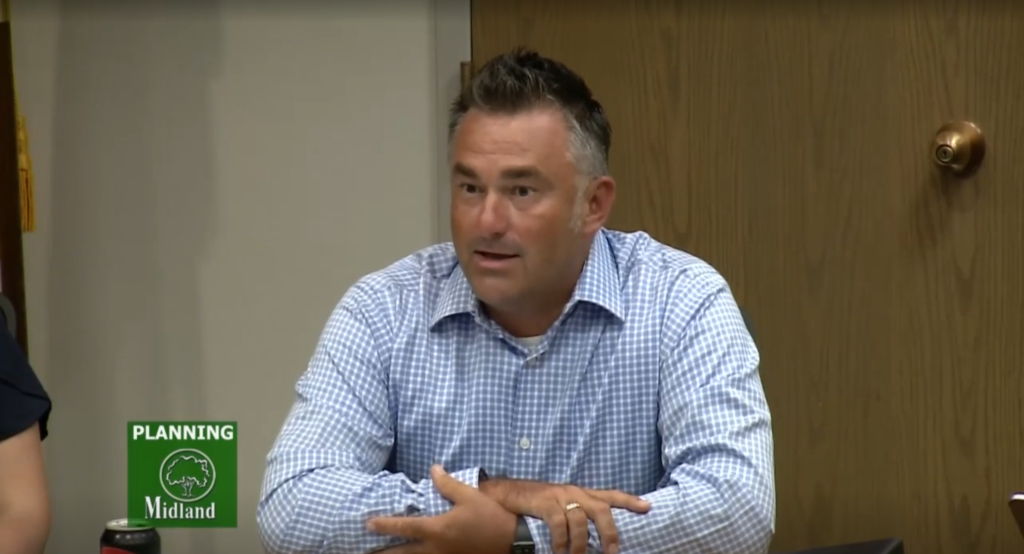
Deckrow appointed to Planning Commission, beating out 7 other applicants
MIDLAND, Mich. — Aaron Deckrow joined the Planning Commission on Tuesday night for the group’s first in-person meeting since the COVID-19 pandemic began. Mr. Deckrow, who is an engineer at Dow and owns Live Oak Coffeehouse with his wife, Renée, was appointed to the commission by the Midland City Council on May 24.
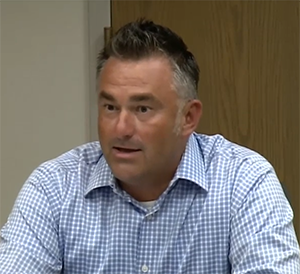
Mr. Deckrow replaces Dave Heying and beat out seven other applicants for his seat on the commission. He was recommended to the City Council for appointment by the two council members responsible for interviewing commission applicants — Councilman Diane Brown Wilhelm (Ward 4) and Mayor Pro Tem Marty Wazbinski (Ward 5).
The other applicants were former commissioner and engineer James E. Stewart; Dow government affairs specialist Bill G. Schuette; John Elsen; Bre Sklar, a disaster volunteer manager for the United Way; Ronald C. Parmele, Rajesh Ojha, a solutions manager at Dow; and Eric Anders.
The list of applicants was not made public by the City of Midland, a practice which was stopped sometime in the mid 2000s. The City Paper obtained application information via a Freedom of Information Act request through the City Attorney’s office. Initially, the City was only willing to release Mr. Deckrow’s application, however after the City Paper indicated it would appeal that decision, the City acquiesced and released all of the applications. The City also granted the City Paper’s request to provide the documents free-of-charge due to the City Paper’s public charity status.
The applications were redacted, with personal information such as home addresses, phone numbers and e-mail addresses omitted. In other documents, such as internal e-mail messages which the City Paper requested, e-mail messages of applicants were not redacted.
The Applicants
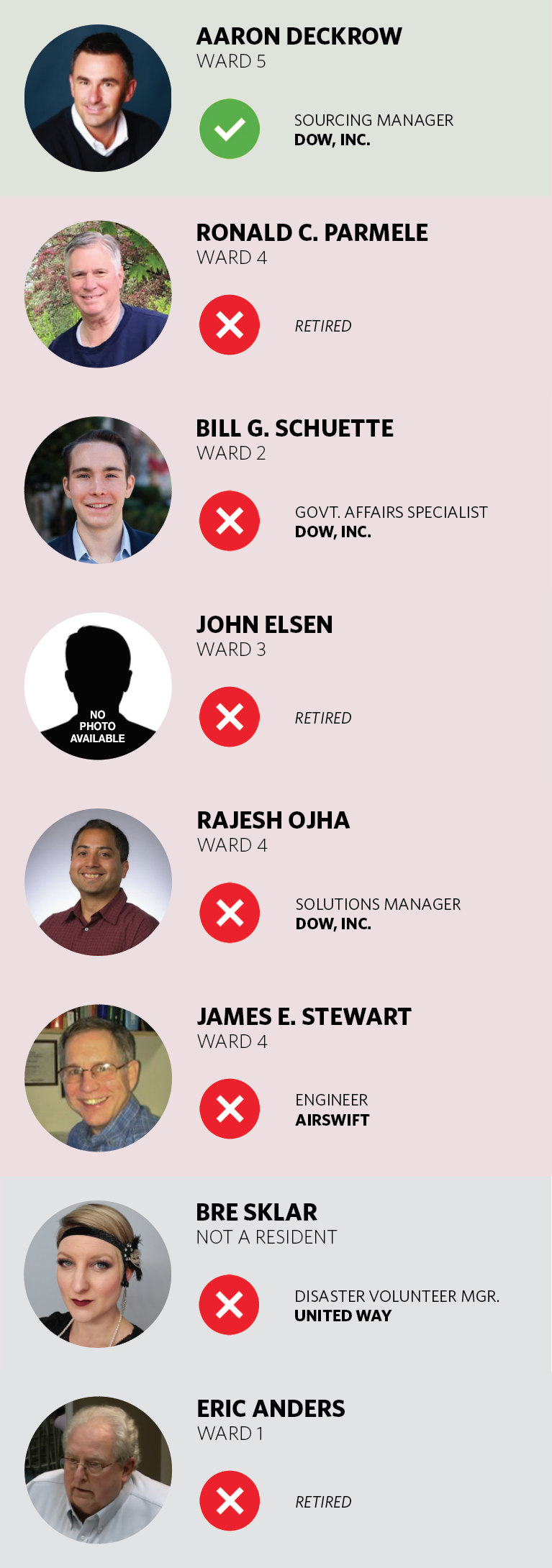
Mr. Stewart, an engineer, applied to be on the commission once again, having served in from 2010 to 2016 before leaving the area due to employment. He cited past experience and that “my profession allows insight into issues that arise before the commission” as to why he felt he was qualified to serve.
“I have a long history with the area and have a true interest in issues facing the city,” he said, adding that he was a 2011 graduate of Leadership Midland.
Mr. Ojha, a solutions manager for Dow, wrote in his application that in the past 20 years, he has lived in four different states, but that “Midland is the place where I have been residing for majority of time amounting to 11 years since 2009.”
Mr. Ojha wrote that he built his first home while staying in Midland and “enjoyed the experience of going through the entire process of identifying, purchasing the land, working with a builder and his contracting partners, learning various stages of the construction process and seeing how various building codes/rules help keep the community look and feel in harmony.”
Mr. Schuette — the son of former Michigan Attorney General Bill Schuette – included a résumé with his application. The resume listed several Washington D.C.-internships as well as his stint serving with the Defense Intelligence Agency as an Intelligence Analyst. Mr. Schuette said that he was the primary drafter of multiple Presidential Daily Briefs “which directly supported Oval Office meetings,” and that he was once recognized as the agency’s Latin America Division “Intelligence Officer of the Year.”
Mr. Schuette has a Master’s Degree in Latin America Studies from Georgetown University. He currently works as a Government Affairs Specialist for Dow, preparing briefing documents for Dow C-suite executives to support their external engagements and board meetings.
“I am interested in serving on the city Planning Commission because I am passionate about Midland’s future and its success,” Mr. Schuette wrote in his application. “I was born and raised in the city and grateful for the wonderful resources it provided our community. I want Midland to continue to be a great place to group, work as a young professional, raise a family and retire.”
Mr. Parmele is retired and worked for Dow Corning, Dow, Delphi and AAA. In his application, he wrote that he was also a member of the Local Planning Body, the board of Friends of the Library, and the Midland Business Alliance where he served on the Government Issues Committee.
“As a Midland resident for over 40 years, I would like to help Midland continue to be a city that is a great place to live and work. Because of this, I would like to have the opportunity to participate in updating the Master Plan,” Mr. Parmele wrote. “The Planning Commission would give me the chance to contribute to continuing and advancing the improvement of the city through development that is beneficial to all the resident of the city. I also want to encourage community participation in the Master Planning process and in the activities that support it.”
Mr. Elsen, a local retiree from Ward 3, submitted a brief application to the City with no attachments and one-sentence answers to the application’s two main questions.
Ms. Sklar, a Disaster Volunteer Manager for the United Way of Midland County, applied to be on the commission, however as a resident of Larkin Township, she was not eligible to serve.
Ms. Sklar attached a résumé to her application which lists her service in the U.S. Army and her business degree from Northwood University.
“I am passionate about this community and love to exemplify servant leadership. There is a lot of growth happening in Midland and I can envision so much potential. I would like to contribute,” she wrote.
Mr. Anders, the gadfly who uses social media platforms to confront perceived corruption and draws the frequent ire of officials within the halls of local government, also applied to be on the commission.
“As a Citizen Academy graduate and full-time retiree with 23 years of community involvement with non-profit group in and around Midland, my knowledge of city departments, policies, ordinances and operations qualify me for contributing to the update of the city’s Modern Master Plan processes and offering informed recommendations on a wide range of local land use issues,” he wrote. “You will find that I’m an informed citizen, mobility challenged resident and former transportation executive, who stays abreast of land use applications, compliance regulations and site plan proposals for redesigns and new developments throughout our Mid Michigan community.”
At the start of Tuesday’s meeting, City of Midland Planning Director Grant Murschel asked Mr. Deckrow to introduce himself.
“My background has been in engineering and business and I currently work at Dow Chemical, but from there I’ve been able to be involved with community, and various efforts, in Midtown with the Ashman Plaza, Live Oak Coffeehouse, and various rental properties in the area, and saw the real need for City planning and what that looks like,” Mr. Deckrow said, “I’ve been at that podium, and, talking about different things that we have planned, and got to see the process of what that was entailed, and for me, I felt that was something I would like to be a part of and really see the future of Midland and what that looks like five, ten, fifteen years from now.”
The process for appointing members of the Planning Commission — and other City boards and commissions — has come under heightened scrutiny recently. Currently, only two members of the City Council sift through applications and interview candidates for openings on the Planning Commission — Mr. Wazbinski and Ms. Brown Wilhelm.
“The two council members with strong input from the director of the department ([Mr. Murschel] in the case of the Planning Commission) settle on the recommendation without input from the other three members,” Councilman Steve Arnosky (Ward 3) told the City Paper, adding that it was standard practice for the other members of the council to not see the applications without a specific request.
The Establishment Bloc
The City Council is comprised of five individuals who represent Midland’s different Wards and hold nonpartisan seats, however there is an ‘establishment bloc’ of members — Mayor Maureen Donker (Ward 2), Mr. Wazbinski, the mayor pro tem (Ward 5), and Ms. Brown Wilhelm (Ward 4) — whose politics lean slightly right and who tend to support the various institutional forces in town. The bloc votes together on nearly all — if not all — matters.
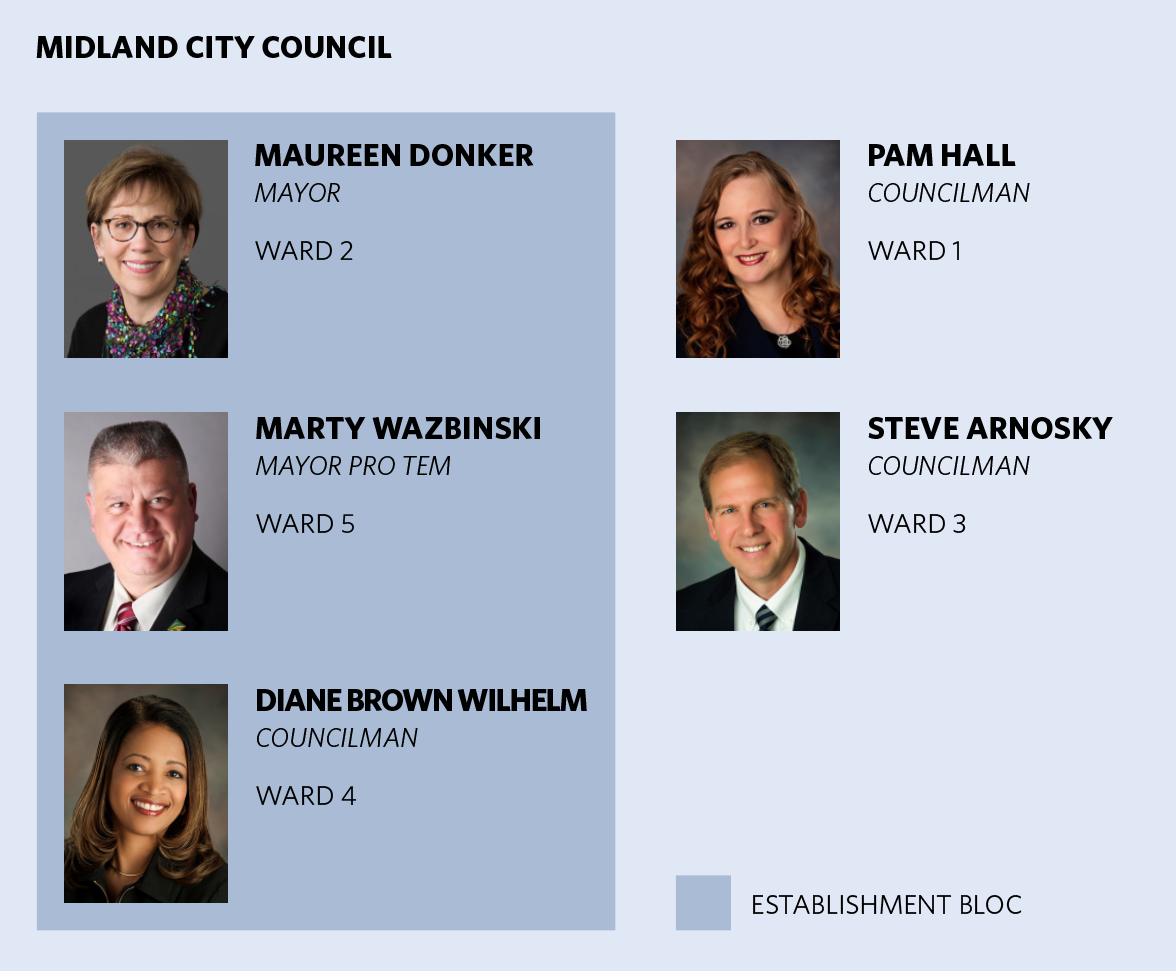
The bloc was the final force cementing the permanent reduction of Buttles Street from three lanes of traffic into two, making what became known as the ‘road diet,’ permanent, despite the policy’s wild unpopularity. In 2019, a City Paper investigative report concluded that “the general consensus was that a [lane] reduction is all but a foregone conclusion due to the business and institutional forces involved in the matter.”
There were concerns that with only two members of the council conducting interviews for the Planning Commission, the body responsible for first approving new developments in the city, the commission could become “stacked” with commissioners whose views aligned with the council’s establishment bloc and not with the remaining members — Mr. Arnosky and Councilman Pam Hall (Ward 1).
Mr. Anders, during the public comment portion of the City Council meeting on May 24, inquired about the interview process for Planning Commission applicants.
“I am the one who appoints council members to do the interviews,” Ms. Donker said to Mr. Anders, during the meeting. “I have appointed councilwoman Brown-Wilhelm because she sat on Planning Commission, and you know, and Mayor Pro Tem Wazbinski had volunteered to do that. We have had — I don’t know if you were listening to that Council meeting — we did have a discussion about that, that we need to shake it up a little bit, so that’s my responsibility, and I will do that moving forward.”
Ms. Donker echoed those comments to the City Paper.
“So we had kind of a discussion about that, and I said hey you know what, I’m the one who did the appointment, I will be — I’ll pay attention to who interviewed last time, does anyone else want to interview?” Ms. Donker told the City Paper. “I’ll say, I think Diane should interview for Planning Commission because she knows it better than any of us,” Ms. Donker said, before requesting to go off-the-record.
During the May 24 meeting of City Council, Ms. Brown Wilhelm attempted to explain to Mr. Anders during a heated back-and-forth public comment portion how the council selects members of the Planning Commission. She said that she looks for citizens who are open and willing to learn, and who would be a good representative of the City.
“We look at reputation and are you going to align with Council’s direction, and make the best recommendations that are for the entire community? Not looking to follow personal interests or special groups — those type of things. So, again, it’s somebody who’s going to have to be the face of the community, and we pay attention to that, in addition to being nonpartisan. All of us on Council are nonpartisan and we also make it known that when you’re on a board or commission, that is also nonpartisan,” she said.
Ms. Brown Wilhelm, while a member of the council, did not face an opponent to obtain the seat which has the power to judge the qualifications she rattled off in her comments. In fact, of the five City Council members, three did not face an opponent for reelection: the members of the establishment bloc. Ms. Brown Wilhelm’s comments about personal interest and special groups, in particular, perked up the ears of opponents of the two-lane Buttles St. proposal, since the council, after making that decision, faced the brunt of numerous allegations of siding with special interests groups, such as the Michigan Baseball Foundation, over the will of Midland’s citizens.
The Deadline
Mr. Anders’ application to join the commission was not considered by Ms. Brown Wilhelm and Mr. Wazbinski because he did not apply until after the deadline of April 2, and he was told that his application would be considered for future openings.
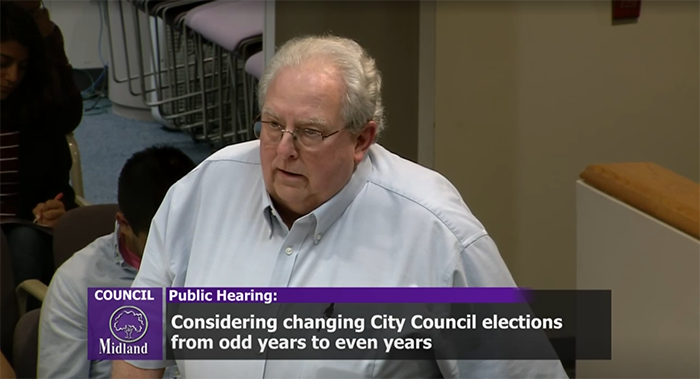
“While the interviews for the current vacancy have been completed, your application will be kept on file for consideration in the future in the event of another opening,” Mr. Murschel wrote to Mr. Anders after he applied.
Later, and upon request, Mr. Murschel provided Mr. Anders with more information about the deadline to apply.
“The City advertised the initial Planning Commission vacancy on March 17th and the deadline to apply was April 2nd,” Mr. Murschel said.
However, Mr. Deckrow, the person that the City Council finally selected for the open seat on the commission, didn’t apply until April 6, contradicting Mr. Murchsel’s claim that the deadline to apply was April 2.
“I have been out of town but have been speaking to Marty Wazbinski about the Planning Commission and wanted to submit my application,” Mr. Deckrow wrote in an e-mail message to a City staff member on April 6, which was obtained by the City Paper. Mr. Deckrow’s application was attached electronically in that message.
“The original filing deadline for applicants interested in sitting on the City Planning Commission was April 2, 2021. Submission of an application by that date assured any applicant that the City would receive and consider their application as part of Council’s review and interview process. Applications received after that date were not assured of such consideration,” City Manager C. Bradley Kaye told the City Paper about the discrepancy between what Mr. Anders was told and the date of Mr. Deckrow’s application. “In this case, the review and interview process did not take place immediately and Mr. Deckrow’s application was received before Council did their review. As such, he was considered with the others.”
Mr. Anders was not told that City Council would consider Planning Commission applicants who applied after the April 2 deadline, but before candidate interviews were scheduled. The interviews were conducted on May 11, May 13, and May 14. Mr. Anders applied for the position on May 13.
Mr. Deckrow’s appointment to the commission became effective May 25.
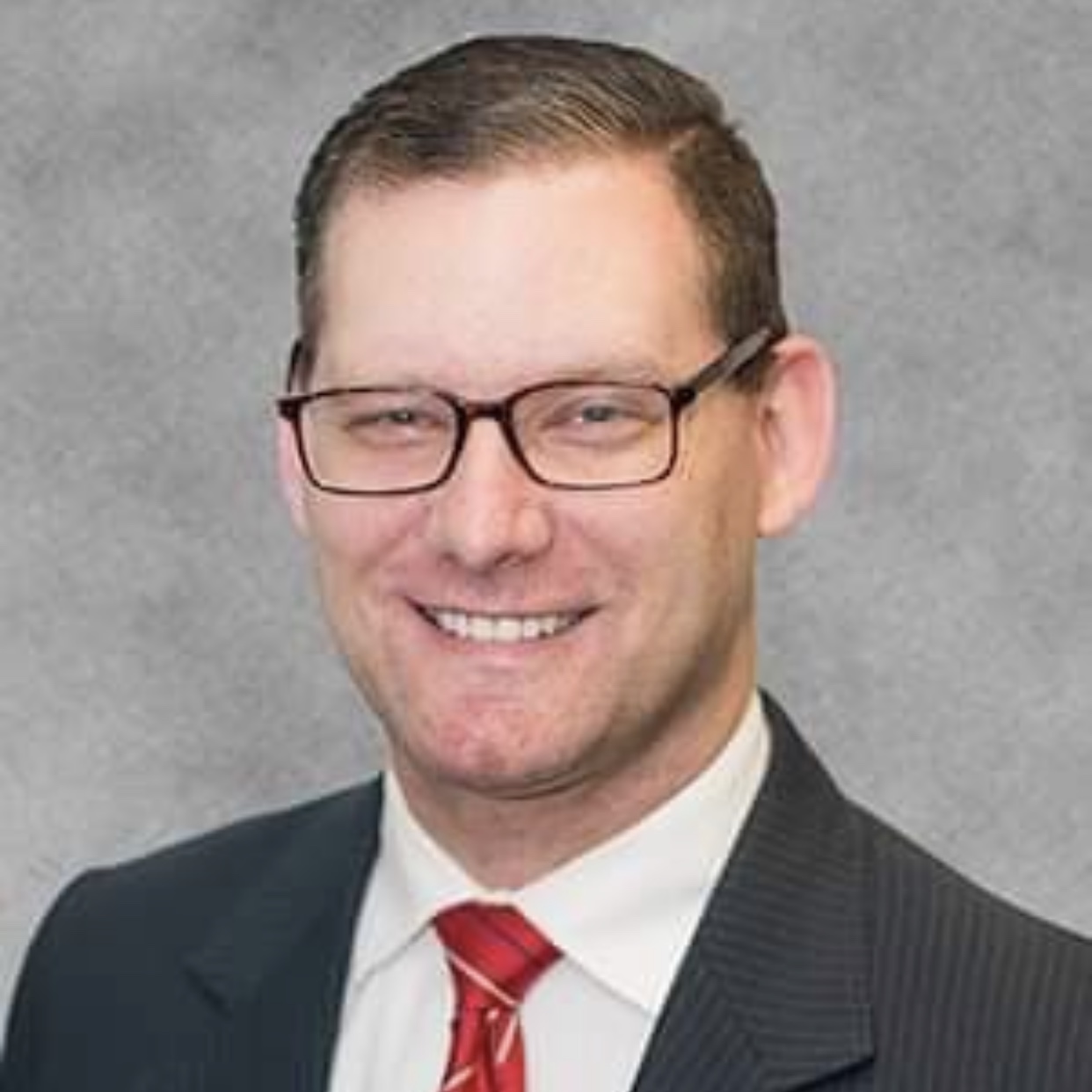
Michael Westendorf is the chairman and executive editor of Chemical City Paper. As Executive Editor, he leads the City Paper’s news coverage and editorial team.

